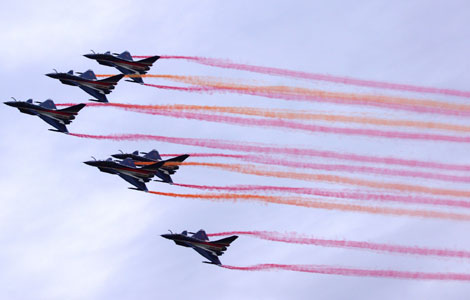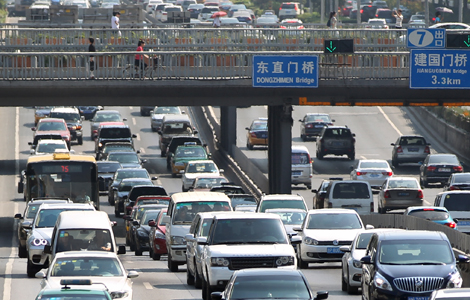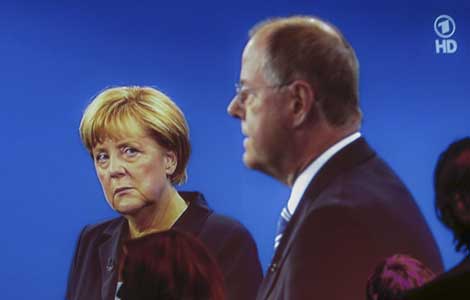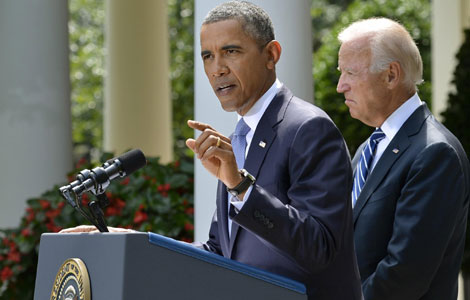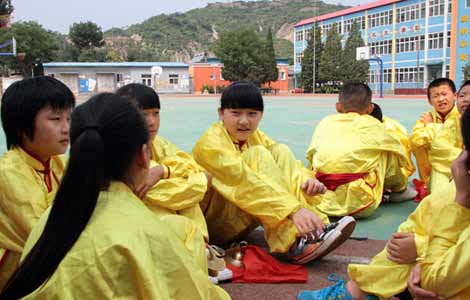West pushing Syria toward total doom
Updated: 2013-09-02 07:39
By Op Rana (China Daily)
|
||||||||
The inevitable is about to happen. Well, it is almost certain to happen. Syrians face imminent bombing by Western forces led by the United States. They face more deaths and destruction, ironically, for suffering what many believe is a chemical weapon attack and seeing more than 100,000 of their compatriots perish and a good part of their country devastated in almost two and half years of civil war.
The Middle East has been a tinderbox since ancient times. Initially, the struggle between the mountain people of the north and desert wanderers of the grasslands turned it into a battlefield for the resources. The "Fertile Crescent" of the Levant, with its crops from wheat and barley to flax and pea, fueled conflicts among warring ethnicities and nations. Religious wars kept the blood flowing from Roman times through to the Crusades and the creation of Israel, which unfortunately continues to this day. The 20th century ignited a different kind of conflict, over oil and waterways (the Suez Canal).
Through all this, the Middle East, home to the oldest civilizations from the Sumerian and Egyptian to the Phoenician and Persian, has survived to develop as a fractured land of pain and suffering amid pockets of riches and luxury. But it has also given birth to militancy and terrorism, partly because of the havoc wreaked upon the land by outside forces and the sufferings of their fellow Muslims in other countries and regions.
The division within the Middle East, mainly sectarian - between Sunnis and Shiites - has been a feature of life for Muslims since the 7th century. Now this division is on the verge of tearing the region apart, with the West playing more than a catalyst's role. As long as Saddam Hussein was in power, Iraq was not considered a Shiite country, even though Shiites comprised the majority of its population. But now with Shiites in power of a devastated Iraq, thanks to the US-led invasion and "occupation" of the country, it's sympathies, though not overtly, lie more with Iran than any of the Arab countries.
Syria, on the other hand, is a Sunni-majority country ruled by Alawites, one of the three main Shiite sects. And that's why the Arab world, represented by the Arab League, is opposed to the Syrian government. Since Syria has close relations with Iran, the leader of the Shiite world which has been at loggerheads with the West as well as the Arab countries, it is seen as a threat by Western politicians and media.
The tragedy is that the Western media, with exceptions, refuse to see the game being played out in the Middle East on the pretext of protecting human rights and spreading democracy. They parrot the pet lines of Western politicians, think tanks with vested interests and gullible scholars. That most of the media outlets are owned or run by large corporations also plays a key role in journalists' views and viewpoints.
For the West, punishing Syria is like punishing Iran in proxy. The Western countries have been seeking an excuse to strike at Iran because it has refused to bow to their demands, especially on its nuclear program, which it claims to be for civilian purposes. In a way, an attack on Syria by the US-led West would also be a proxy attack on Russia and China, because the two countries have been asking the Western countries to resolve the Syrian conflict politically through negotiations.
It is still disputable whether the Syrian government forces or the rebels carried out the "chemical attack" in a Damascus neighborhood on Aug 21. Even the UN inspectors who studied the site of the chemical attack have not yet reached a conclusion on which side is to blame for the attack. But that has not stopped the West from preparing to go on the offensive against Syrian President Bashar al-Assad.
The mindless invasion of Iraq and Afghanistan should have made the West wary of indulging in another bloody war game. Perhaps it has, for British Prime Minister David Cameron said he is not 100 percent certain of intelligence reports that suggest Assad might have ordered the chemical attack. But paradoxically he is one of the Western leaders most eager to see action against the Syrian government.
The British Parliament has rejected his plea to launch an attack, though. With Russia and China opposed to military action against Assad, we hope Syria doesn't turn into the Korea and Vietnam of the 21st century. But then the Nobel Peace Prize winning president of the United States has to prove a point to justify his presidency, irrespective of the consequences, even though he claims to have a sound knowledge of history and what is good for humankind.
The author is a senior editor with China Daily.
E-mail: oprana@chinadaily.com.cn
(China Daily USA 09/02/2013 page11)
Most Viewed
Editor's Picks

|

|

|

|

|

|
Today's Top News
Top companies should adapt to slower growth
Chinese economy 'very strong' in long term
Sowing the seeds of sustained growth
Experts: US unwise to wage war on Assad
Visas for China get simplified
DPRK rescinds invite to US envoy
SASAC head target in graft probe
Eurasian nations focus on Net
US Weekly

|

|
